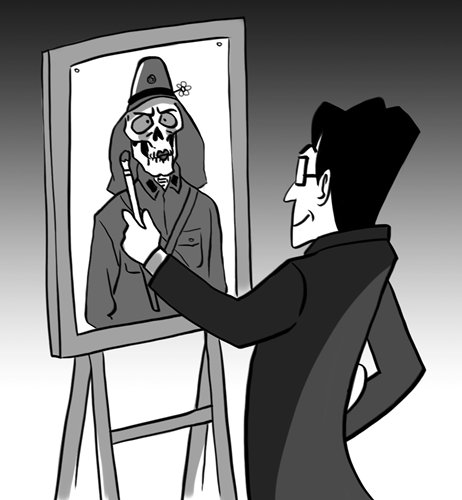
Illustration: Liu Rui/GT
On July 17, Japanese anime director Yutaka Yamamoto posted on his blog that Japan was working to promote the "Greater East Asia Co-prosperity Sphere" during WWII. He also claimed that the Japanese invasion had improved both the infrastructure and people's literacy rate in the invaded nations. In addition, he defended his right-wing rhetoric on his Twitter account. His ridiculous remarks have been answered with a massive uproar and condemnation among Chinese netizens.
Yamamoto stepped into the anime industry in 1997. According to anime fans, Yamamoto is a marginal figure in the Japanese anime industry, and has not created any breakthrough works. This can be seen from his crowd-funding campaign to raise money from Chinese netizens because of scant financial support in Japan.
The defense of himself that he offered on Twitter after his blog post that whitewashed Japanese crimes in WWII seems to follow the line of thought of Toshio Motoya, founder and CEO of the APA Group, which operates the largest group of hotels in Japan and placed publications featuring distorted history in its hotel rooms. The two attempt to portray themselves as patriotic heroes by fabricating and defending historically inaccurate statements.
However, Japanese mainstream media outlets haven't covered Yamamoto's false claims, indicating he has not only failed to hype up his ridiculous claims but also tarnished the reputation of Japanese anime directors.
Yamamoto's claims on the war crimes committed by the Japanese during WWII reflect the distorted historical views embraced by himself and the Japanese right wing. For example, his ignorance can be clearly seen from his defense for the Japanese intrusion during WWII by stressing "contributions" made by the Japanese troops to their colonies. If the Japanese invasions during WWII make sense, how does he explain the physical abuse and mental trauma caused by the atrocities of Japanese armed forces on invaded nations, such as comfort women, the Nanjing Massacre and ferocious crimes committed by Japanese Army Unit 731, a germ warfare unit once stationed in Northeast China's Heilongjiang Province?
Therefore, people like Yamamoto who assume the Japanese army's intrusion and occupation brought prosperity and development to the invaded nations need to visit the Nanjing Massacre memorial hall and the historical site of Japanese Army Unit 731 in Harbin, Heilongjiang Province, as well as watch Twenty Two, a Chinese documentary depicting the 22 remaining comfort women in China. They should speak out after learning more historical facts and knowledge.
Chinese anime fans' strong backlash against Yamamoto's right-wing rhetoric shows that although Japanese animation has gained world recognition, Chinese anime lovers still hold their principles and position on historical facts. With the increase in Chinese people's per capita income and their awareness of protecting copyrights of video streaming, the Chinese market is becoming more attractive to Japanese anime. China's leading video platforms like Bilibili and LETV have purchased the intellectual property rights of Japanese animated works at a high price. In addition, Japanese animated films, such as Your Name, a hit mystical teenage body-swap movie directed by Makoto Shinkai last year, have achieved great success in China, which undoubtedly boosts the confidence of the Japanese anime industry.
Against this backdrop, Yamamoto is eager to grab market share in China, so he wrote another blog entry to express his willingness to visit Beijing for a public activity after his ridiculous post that tried to whitewash Japanese war crimes. However, Yamamoto's attempt to reap profits in China and build a heroic image in Japan is definitely opposed by Chinese anime fans.
Yamamoto's inferior ability to produce anime and narrow views on historical issues have determined that he can't become a world famous anime director. On one hand, he and Shinkai got into the anime industry nearly at the same time, but as Shinkai has garnered remarkable achievements around the globe both in artistry and economic gains, Yamamoto has to produce animated films only through crowd-funding campaigns. On the other, he needs to learn from Hayao Miyazaki who won the Oscar honorary lifetime achievement award and respect from Asian, European and American people due to his prominent animated works and righteous attitude toward historical issues.
Therefore, Yamamoto should reflect on himself and put more time and energy in producing quality animated works. Making irresponsible remarks on historical issues will only smear the long development history of the Japanese anime industry and make him into nothing but a clown.
The author is a PhD candidate at the Graduate School of Sociology at Toyo University. opinion@globaltimes.com.cn
